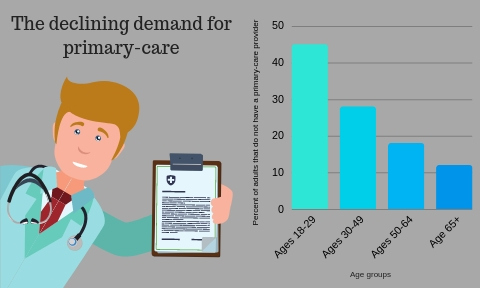
By Raegan Turner | Staff Writer
The uptick of urgent care facilities and walk-in clinics springing up across the United States reflect the recent generations’ increasing desire for alternatives to primary care providers, according to an article from the Washington Post.
Convenience and price are the dominant reasons for the shift away from family physicians towards these quick-serving clinics. According to the The Washington Post article, a national poll was conducted this summer, consisting of 1,200 adults who were chosen at random. The Kaiser Family Foundation, which facilitated the poll, discovered that 26 percent of the participants lacked a primary care provider. As shown in the data, the percentage of people who do not have a doctor they regularly visit increases the younger the population. Almost half of people in their teens to late twenties did not have a primary care provider. This statistic decreases to thirty percent in 30 to 50 year olds. Only around twenty percent of senior citizens live without a primary care provider.
“There was a pronounced difference among age groups: 45 percent of 18 to 29-year-olds had no primary care provider, compared with 28 percent of those 30 to 49, 18 percent of those 50 to 64 and 12 percent age 65 and older,” the article concluded.
College students are within the main age group that is moving away from steady healthcare providers, according to the Washington Post. Many students do not have quick in-person access to their normal primary-care doctor due to distance from home. Instead of finding another doctor here in Waco, many turn to clinics, whose features of long hours, lower costs, and little waiting-time are appealing.
Keller junior Anthony Deleon described his experience at FastMed Urgent Care in Waco, which he visited the spring of his freshman year. He appreciated the speediness of the experience.
“It was quick and easy — I got my medicine and I was gone.” Deleon said.
Despite his positive experience at this appointment, a previous one did not go as well. He told another account of a visit to an urgent care clinic in the Dallas-Fort Worth area that initially failed to provide adequate care.
“I did have a bad experience at a clinic a while ago,” DeLeon said. “Two summers ago I had a double ear infection and it was awful. They gave me some medicine, but it didn’t work and they didn’t really seem to know what to do. So I went to another one, and they told me I should have been given this steroid shot that I needed because I was really sick. This time they gave me the right thing and I felt better. Sometimes you have to go to different ones — it’s like a little business.”
Uncommon Healthcare, a local medical practice in Waco, founded by Dr. Felicia Macik, is changing up the norms of primary care. The practice identifies itself as Waco’s first direct primary care family medicine practice. Uncommon Healthcare is different from both quick clinics and conventional primary care facilities in that they do not participate in any health insurance programs or government health programs. Patients are part of a membership and pay an aged-based monthly fee. Because of this, patients do not pay anything when they come in.
Dr. Nancy Jill Clay, a physician at the Uncommon Healthcare, explained why having a consistent primary-care doctor is important.
“If a doctor knows you and knows your personality, history and normal physical status, it is easier to know when something is out of whack. We are focused on forming long-term relationships with patients because it lends itself to better care. People who know you are able to treat you better,” Clay said.





